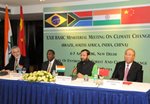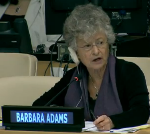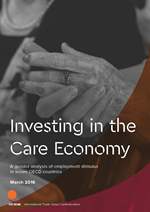Published on Fri, 2016-04-08 14:56
At their first meeting since the Paris climate summit, Ministers and representatives from Brazil, South Africa, India and China (BASIC) reiterated the importance of raising pre-2020 actions in building trust amongst the Parties to pave the way for the implementation of the Paris Agreement. The ministers noted with concern the pending ratification by many Annex I Parties (developed countries) of the Doha Amendment which established the second commitment period of the Kyoto Protocol (2013-2020), urging Annex I Parties to both ratify and revisit their pledges of Quantified Emission Limitation and Reduction Objectives to close the emission gap. |
Published on Wed, 2016-04-06 13:44
What do the human rights principles of equality and non-discrimination mean for tax policy? This is the question at the center of the first in a series of four advocacy tools on tax policy and human rights produced by RightingFinance. The aim of the advocacy tools is to assist education and dissemination of the standards on tax policy and human rights contained in a report produced by the UN Special Rapporteur on Extreme Poverty and Human Rights in 2014 (“the report”). Each of them contains a section on the normative foundations of the principles in question, another on their applications to tax policy – including explanations and references to practical examples – and a third one with guiding questions for reflection. |
Published on Thu, 2016-03-31 14:26
During the session on “accountability and transparency of multi-stakeholder partnerships” held in the framework of the Partnership Forum at the UN, Barbara Adams from Global Policy Forum and Social Watch said that partnerships are based in a win-win dynamic but there is a need to understand of what is "win-win". Would be beneficiaries of such initiatives have to be included, she argued. "We need to look and see how the contribution of partnerships has benefits. We need a more systemic approach when we are looking at the win-win approach". |
Published on Wed, 2016-03-30 14:49
More public investment in caring infrastructure is well warranted under existing evidence, is the message that emerges from a new study released recently by the ITUC (“the study”). The study shows that investment into the care economy of 2 per cent of GDP in just 7 countries would create over 21 million jobs and help countries overcome the twin challenges of ageing populations and economic stagnation. Investing in care narrows the gender pay gap, reduces overall inequality and helps redress the exclusion of women from decent jobs. |
Published on Tue, 2016-03-29 14:26
The United Nations Conference on Trade and Development (UNCTAD) concept of interdependence between countries and policy areas can be employed in the follow-up and monitoring of the implementation of the 2030 Agenda for Sustainable Development, says a recent policy brief of this international agency. UNCTAD argues that the 2030 Agenda for Sustainable Development substantially increases the demand for evidence-based analysis and integrated and coordinated policy support. |
SUSCRIBE TO OUR NEWSLETTER







